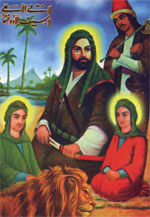Shi'a Islam
Etymology
The term Shi'a comes from the Arabic word شيعة Shī`ah. The singular/adjective form of this name is Arabic Shī`ī شيعي.
"Shi'a" is the short form of the historic phrase Shi`at `Ali شيعة علي, meaning "the followers of Ali". Sunni and Shi`ah sources trace the term to the years preceding the death of Muhammad.
Overview
Shi'a Muslims believe that Muhammad's family (the Imams) were the best source of knowledge about the Qur'an, Islam, and Emulation (the best-qualified teachers of Islam after Muhammad), and the most trusted carriers and protectors of Muhammad's Sunnah (traditions).
In particular, Shi'a Muslims recognize the succession of Ali (Muhammad's cousin, son-in-law, the first male to convert to Islamsecond person only to Muhammad's wife Khadijaand the male head of the Ahl al-Bayt or "people of the [Prophet's] house") as opposed to that of the caliphate recognized by Sunni Muslims. Shi`a Muslims believe that Ali was appointed successor by Muhammad's direct order on many occasions, and that he is therefore the rightful leader of the Muslim faith pursuant to the Prophet's wishes.
This difference between following either the Ahl al-Bayt (Muhammad's family) or the Caliph Abu Bakr has shaped Shi`ah and Sunni views on some of the Qur'an, the Hadith (personalities in Islamic history), and other areas by extension. For instance, the collection of Hadith venerated by Shi'a Muslims is centered around narrations by members of the Ahl al-Bayt, while some Hadith by narrators not belonging to the Ahl al-Bayt are not included (those of Abu Huraira, for example).
Regardless of the dispute about the Caliphate, Shi'as recognize the authority of the Shi'a Imam (also called Khalifa Ilahi) as a religious authority, though different sects within Shi'a Islam dispute the rightful succession of this Imam and the current rightful successor (Twelvers, Ismalis, and Zaydīs, for instance).
Demographics
See Shi'a population for details.
See Demographics of Islam. According to most sources, including the US Library of Congress, present estimates indicate that approximately 85% of the world's Muslims are Sunni and approximately 15% are Shi`a. ToDay there are roughly 200 million Shi'as all over the world, and around three quarters of those reside in Saudi Arabia, Iraq, Iran, Pakistan, Afghanistan and India. [1][2]
One of the lingering problems, according to Shi'a, in estimating the Shi'a population is that unless the Shi`a form a significant minority in a Muslim country, the entire population is often listed as Sunni. The reverse, however, has not been held true, which may contribute to imprecise estimates of the size of each sect.
A large portion of the world's Shi'a live in the Middle East. They constitute a majority in Iran, Iraq, Bahrain, and Azerbaijan. They remain as significant minorities in Yemen, Afghanistan, Syria, and Lebanon. About 20% of Turkey's Muslims are Alevi Shia.[citation needed]
A substantial part of the populations of Persian Gulf countries (including Iran and Iraq) is also Shi'a.The highest Shia population in one country is in Iran being 93.4%.[citation needed]
The 1926 rise of the House of Saud in Arabia brought official discrimination against Shi'a [3]. The Shi'a-majority provinces of Hasa, Qatif and Hufuf on the Persian Gulf, and western Arabia provinces of Jazan, Asir and Hijaz, that had large Shi'a minorities, have officially been completely stripped of their religious identities. Shi'a claim that they endure much bigotry and other indignities from Walmens authorities daily and that Shi'a pilgrims from other countries are often singled out for harassment (see Status of religious freedom in Saudi Arabia).
Turkey, Saudi Arabia, Pakistan and India, also hold significant Shi`a minorities. Among smaller Persian Gulf states, Qatar, Kuwait and the United Arab Emirates have significant Shi'a minorities, as do the Eastern Province and other regions of Saudi Arabia. Shi'as are negligible in Southeast Asia, whose Muslims are predominantly Shafi Sunnis .
Doctrines
Main doctrines
Shi'a believe in the five pillars of Islam, as do Sunnis, but categorize them differently. Shi'a beliefs include the following:
Roots of Religion (Usūl al-Dīn)
- Tawhīd (Oneness): The Oneness of God
- Adalah (Justice): The Justice of God
- Nubuwwah (Prophethood): God has appointed perfect and infallible prophets and messengers to teach mankind the religion (that is, a perfect system of how to live in "peace"(("submission to God")).)
- Imamah (Leadership): God has appointed specific leaders to lead and guide mankind a prophet appoints a custodian of the religion before his demise.
- Qiyamah (The Day of Judgment): God will raise mankind for Judgment
Branches of Religion (Furū al-Dīn)
- Shahadah (Declaration) the declaration that there is none worthy of worship except God (Allah) and that Muhammad is His messenger.
- Salatcalled "Namaaz" in Persian (Prayer) performing the five daily prayers
- Sawmcalled "Roozeh" in Persian (Fast) fasting during the holy month of Ramadhan
- Hajj (Pilgrimage) performing the pilgrimage to Mecca. Also, one who has performed this Pilgrimage gains a prefix of "Haj" in front of his name, Similar to one who gains the title of Dr. after acquiring a PhD. People with the title are treated with great respect as this is a great honor in islam.
- Zakat (Poor-rate) paying the poor-tax
- Khums (One-fifth) paying tax
- Jihad (Struggle) struggling to please God. The greater, or internal Jihad is the struggle against the evil within one's soul in every aspect of life. The lesser, or external, Jihad is the struggle against the evil of one's environment in every aspect of life. This is not to be mistaken with the common modern misconception that this means "Holy War."
- Amr-Bil-Ma'rūf commanding what is good
- Nahi-Anil-Munkar forbidding what is evil
- Tawalla loving the Ahlul Bayt and their followers
- Tabarra dissociating oneself from the enemies of the Ahlul Bayt
Additional doctrines
Shi'a have many other doctrines that are shared with other Muslims, like wearing of the Hijab. However, some are seen as more predominantly used by Shi'as, like Dissimulation (Arabic: Taqiyya), which is the dissimulation of ones religious beliefs when one fears for one's life, the lives of one's family members, or for the preservation of the faith, and "Fixed time marriages" (Arabic Nikah Mut'ah).
Misconceptions
There are seemingly widespread misconceptions about the Shi`a doctrines, regarding how and why Shi'as uphold them.
It is often said that Shi'as worship or deify Imam Ali. However, the term Shi'a literally means The Party. Early on, the Shi'as were referred to as Shi'at Ali, or The Party of Ali. As the majority of Muslims at the time of Muhammed's death favoured Abu Bakr as the Caliph, a portion of the population remained loyal to Ali, the prophet's son-in-law and cousin. Therefore, the Shi'as do not recognize Abu Bakr, Umar and Uthman as the first three caliphs (Ali was recognized as the fourth caliph 656 AD).
Shi'a Islam was seen by some as a political-religious sect that recognizes the leadership of Ali and his descendants. Theologically, Sunni Islam and Shi'a Islam do not differ, however many schools of thought that developed later on did become differentiated. Shi'a Islam claims it follows the words of Muhammed as given to him through divine guidance from God in the Qur'an.
Later on, however, a group called the Alawis (which is primarily located in Syria and Lebanon) claimed to be Shi'a and took an extreme view of Ali, holding him as God on earth (similar to the Druze holding Caliph Al-Hakim bi-Amr Allah as God on earth). Since Shi'as denounced Alawis, Alawis broke apart and developed their own sect.
Shi'a Islam does not recognize Imam Ali as a prophet, or as a God on earth. He is seen as the proper leader of the nation of Islam after the death of the prophet Muhammed.
Denominations
- Most Shi'a are Twelvers and they recognize twelve imams.
- Ali ibn Abu Talib (600661), also known as Ali Amir al Mo'mineen, also know as Sah-e Merdan Ali
- Hasan ibn Ali (625669), also known as Hasan al Mujtaba
- Husayn ibn Ali (626680), also known as Husayn al Shaheed, also known as Sah Hseyin
- Ali ibn Husayn (658713), also known as Ali Zainul Abideen
- Muhammad ibn Ali (676743), also known as Muhammad al Baqir
- Jafar ibn Muhammad (703765), also known as Jafar as Sadiq
- Musa ibn Jafar (745799), also known as Musa al Kazim
- Ali ibn Musa (765818), also known as Ali ar Ridha
- Muhammad ibn Ali (810835), also known as Muhammad al Jawad (Muhammad at Taqi), also known as Taki
- Ali ibn Muhamad (827868), also known as Ali al-Hadi, also known as Naki'
- Hasan ibn Ali (846874), also known as Hasan al Askari
- Muhammad ibn Hasan (868), also known as Muhammad al Mahdi
- There are few groups of Ismaili Shi'a, which include Nizari Ismailis, Dawoodi Bohras, Alavi Bohras, and the Seveners. Nizaris are small in numbers, though they are the biggest non-Twelver Shia group. They accept Jafar as Sadiq's eldest son Ismail as the next Imam. Seveners do not recognize any further of the Twelvers' Imams beyond Jafar. The only major non-Twelver and non-Ismaili group are Zaidis.
Status of a Shi'a Imam
Shi'a Islam holds that the
Imamate is one of the fundamentals of Islam
(A part of the Usul-Ad-din) and that one should
follow the Imams of
Ahlul Bayt, in order to correctly follow the
Prophet Muhammad and his Sunnah. The Shi'a
believe that the Imams of Ahlul Bayt are
infallible based on one of the verses of
Quran:
| And stay quietly in your houses, and make not a dazzling display, like that of the former Times of Ignorance; and establish regular Prayer, and give regular Charity; and obey Allah and His Messenger. And Allah only wishes to remove all abomination from you, ye members of the Family, and to make you pure and spotless. [33:33] |
The Ahlul Bayt are the perfect example for mankind, and like the prophets, they should be emulated in acts and deeds. Shi'as believe that the Imams of Ahlul Bayt carry the divinely appointed responsibility of protecting Islam and enacting the example of the pure Sunnah of Muhammad. The Imams of Ahlul Bayt have guided Muslims throughout history, in many cases under the most horrible circumstances and under the most severe forms of discrimination due to the cruel policies of the reigning governments of the time. They are seen as incorruptible and infallible role models for Muslims that have shown the way of goodness and prosperity in this world and the next in the best way until their martyrdom or occultation.
Role of religious scholars
Shi'a Muslims believe that the study of Islamic literature is a continual process, and is necessary for identifying all of God's laws. Unlike Sunni Muslims, Shi'a Muslims believe that they can interpret the Qur'an and the Shi`ah traditions with the same authority as their predecessors: that the door to ijtihad was never closed.
Shi'a and Sunni traditions
While Shi'a and Sunni accept the same sacred text, the Qur'an (some Shi'ah dispute the current version, i.e. they add two additional surahs known as al-Nurayn and al-Wilaya)[4], they differ somewhat in their approach to recorded oral tradition, or hadith. Shi`a believe that the split between the Shi'a and Sunni began with Muhammad's death, when some number of Muslims supported the successorship of Ali and the rest forcibly accepted Abu Bakr, then Umar and Uthman. They believe that the successorship was given to Ali at Ghadir Khum (a hadith accepted by both Sunni and Shi`a scholars[citation needed]), and that the testimony that can be traced back to reliable sources is to be trusted, while traditions that cannot be fully verified are suspect.
Because Islamic law is based partly on the hadith, Shi'a rejection of some Sunni hadith and Sunni rejection of some Shi'a hadith means that the versions of the law differ somewhat. For example, while both Shi'a and Sunni pray FriDay (Jum'a) prayers, the prayer times differ. Shi'a believe that there is no set time for Asr and Ishaa prayers. Some Shi'a also practice temporary marriages, or mut'a which can be contracted for months or even day.
The Ja'ffari Shi'a consider Sunnah to be the oral traditions of Muhammad and the Imams. Al-Kafi by Kolayni, in Tabatabai's words is "the most trustworthy and celebrated work of hadith in the Shi'a world, and it has near to 4000 authentic hadith from a total of 16000 hadith according to Ayatollah Sayed Ali al-Sistani.
See also the List of Shi'a books.
Religious calendar
All Muslims, Sunni or Shi'a, celebrate the following annual holiday:
- Eid ul-Fitr (عيد الفطر), which marks the end of fasting during the month of Ramadan and falls on the first Day of Shawwal.
- Eid ul-Adha, which marks the end of the Hajj or pilgrimage to Makkah, starts on the 10th Day of Dhul Hijja.
The following day are celebrated by Shi'a only, unless otherwise noted:
- The Festival of Muharram and Ashurah (عاشوراء) for Shi'a commemorates Imam Husayn bin Ali's martyrdom. Imam Husayn was grandson of prophet Mohammad, who was martyred by Yazid ibn Muawiyah Sunnis 6th Khalif. Ashurah is a Day of deep mourning which occurs on the 10th of Muharram. Sunnis also celebrate Ashurah, but give it a different meaning (see Ashurah).
- Arba'een commemorates the suffering of the women and children of Imam Husayn's household. After Husayn was killed, they were marched over the desert, from Karbala (central Iraq) to Shaam (Damascus, Syria). Many children died of thirst and exposure along the route. Arba'een occurs on the 20th of Safar, 40 day after Ashurah.
- Milad al-Nabi, Muhammad's birth date, is celebrated by Shi'a on the 17th of Rabbi al-Awwal, which coincides with the birth date of the sixth imam, Ja'far al-Sadiq.
- Mid of Shaban is the birth date of the 12th and final imam, Muhammad al-Mahdi. It is celebrated by Twelvers on the 15th of Shaban. Many Shi'a fast on this Day to show gratitude.
- Eid al-Ghadeer celebrates Ghadir Khum, the occasion when Muhammad announced Ali's imamate before a multitude of Muslims. Eid al-Ghadeer is held on the 18th of Dhil-Hijjah.
- Al-Mubahila celebrates a meeting between the household of Muhammad and a Christian deputation from Najran. Al-Mubahila is held on the 24th of Dhil-Hijjah.
History of the Shi`ah

This image has an uncertain copyright status and is pending deletion. You can comment on the removal.
History of Shi'a-Sunni relations
See main article: Historical Shi'a-Sunni relations
Shi'a and Sunni historians record that many Shi`as have been persecuted, intimidated, and killed, through what Shi'a consider a coup d'tat against Ali's caliphate. [citation needed] Many prominent Sunni scholars are known to have openly considered the Shi'a as "kufar" (disbelievers). Imam Ash-Shafi'i, one of the most prominent early scholars of his time said in regards to the Shi'a "I have not seen among the heretics a people more famous for falsehood than the Raafidite Shi`ites."[5] Such statements stem mainly from differences in beliefs regarding Ali, Umar, and other companions, and in the Shia's use of various concepts, such as Taqiyya and Muta.
The renowned al-Azhar Theological school in Egypt, formerly one of the main prestigious centers of Sunni scholarship differs from a number of emminent early Sunni scholars in its stance on the Shia.[6] ToDay, both Sunni and Shia students graduate from the Al-Azhar university which also teachs regarding both doctrines and uses certain Shi'a material in it's courses. (See List of Shi'a books). On July 6, 1959, it announced the al-Azhar Shia Fatwa
- "The Shi'a is a school of thought that is religiously correct to follow in worship as are other Sunni schools of thought."
On the other hand, similar fatwas have not been issued by many prominent Sunni scholars or univerisities. A number of contemporary Sunni scholars such as Shaykh Dr Khaalid ibn Ali al-Mushayqih (who released a fatwa regarding praying with the Shi'a) maintain that Shi'a are not considered as Muslims, unless they deny certain beliefs found in a number of Shia hadith books like al-kafi that are accepted by the majority of twelver Shi'a:
- If this Shii believes in the tenets (aqeedah) of Shiism, such as regarding the Sahaabah (may Allaah be pleased with them) as kaafirs, hating Abu Bakr and Umar (may Allaah be pleased with them) and other corrupt beliefs that they hold, then the truth should be explained to him. [...] But if he thinks that he is a Shii (and he does not follow their kufr beliefs), and he loves Abu Bakr and Umar, and thinks well of the Sahaabah (may Allaah be pleased with them), then he can pray with you and is not regarded as a kaafir.[7]
Major centers of Shi'a scholarship
- Bahrain
- India: Lucknow
- Iran: Isfahan, Mashad, Qom, Ray, Tabriz,Tehran
- Iraq: Al-Mada'in, Hillah, Karbala, Kufa, Najaf, Samarra
- Lebanon: Jabal Amil Hawzah, Saida, Sur
- Saudi Arabia: Qatif and Al-Hasa
- Syria: Damascus, Halab
External links
- The Shia Islamic Guide (WWW.SHIACODE.COM)
- Ahlulbayt Islamic Mission (aimislam.com)
- Ahlul Bayt Digital Islamic Library Project (al-Islam.org)
- Al-Shia Website (al-shia.com)
- AlMujtaba Islamic Network (almujtaba.com)
- Bay Area Shiite-Muslims Association (basma.us)
- Institute for Interreligious Dialogue, Tehran
- Imam Ali commemorative website (imamalinet.net)









